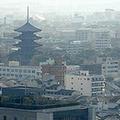 京都,以世界上第一個完成國際溫室氣體減量協定而聞名的地方,如今已發展了另一種減少自己本身溫室氣體排放量的方式。
京都,以世界上第一個完成國際溫室氣體減量協定而聞名的地方,如今已發展了另一種減少自己本身溫室氣體排放量的方式。
宮古21議程論壇(Miyako Agenda21 Forum)是一個環保聯盟組織,設於京都,並由市民、企業團體以及周邊的地方城市一起合作發展了「宮古綠色能源認證系統」(Miyako Green Power Certification System)。該系統的目的在於促進「本地生產、本地消費」,應用太陽能發電的方式,有助減緩全球暖化。
該組織表示,在此系統底下的首項認證專案為「京都花燈路」(Kyoto Hanatoro)活動,其是一種燈光與花卉的景觀活動,每年12月在嵐山區(Arashiyama Area),3月在東山區(Higashiyama Area)都會舉行。
該論壇所販售的綠色能源計價方式為,由京都市各企業、社團、或縣市政府所舉辦的活動用電量每度為10塊日幣,藉此換取更高的環保價值,如二氧化碳減量。此外,論壇也授權各企業團體得以使用他們的商標。
雖然持有認證的公司必須要負擔多一些的額外成本,但是卻能夠達到宣傳的效用,表示其對環境友善並提升公司形象。
售出的認證收入將會轉入現存的陽光基金,用以推動發電廠的設置,透過太陽能光電(solar photovoltaic, PV)的裝置直接將陽光轉成電力。
而非營利組織-京都綠色基金(Kyoto Green Fund),從2001年3月開始即在當地的托兒所和幼稚園設置了太陽能光電發電廠,並將太陽能光電發電廠的設置引進日本的環境教育。
京都的第10座太陽能光電發電廠設於瑪歐莉安(Myorin-en)托兒所,已於2007年5月開始運作,發電廠的電力容量是10千瓦,其每年的電能產值輸出為10,000千瓦小時(度),是學校每年用電量的1/8。
而京都大宮(Omiya)托兒所的太陽能光電發電廠則可以供應該校每年用電量的2/3。
京都綠色基金的理念認為,環境意識的培育,最好是在孩童早期的日常生活中慢慢養成,而非透過書本學習知識。
The city of Kyoto, famous as the place where the world's first climate change treaty requiring greenhouse gas reductions was agreed, has developed a way to reduce its own greenhouse gases.
The Miyako Agenda21 Forum, an environmental partnership organization established by Kyoto City in collaboration with its citizens, businesses and surrounding local municipalities, has launched the Miyako Green Power Certification System.
The system aims to promote "local production for local consumption" of solar power as a way of helping curb global warming.
According to the organization, the first project certified under the system will be the Kyoto Hanatoro, illumination and flower sight-seeing events that are to be held annually at Arashiyama Area in December and Higashiyama Area in March.
The Forum sells Certificates of Green Power at 10 yen (about 9 US cents) per kilowatt hour to events held by businesses, associations and municipal governments in the Kyoto City area, and trades them for environmental values such as carbon dioxide reduction.
The Forum also authorizes the use of their logo to businesses.
Companies holding the certificates have to bear some additional costs but can publicize themselves as environmentally friendly and improve their corporate images.
Proceeds from sales of the certificates will go to the existing Sunshine Fund for promoting power plant installations that convert sunlight directly into electricity through arrays of solar photovoltaic, PV, cells.
The Kyoto Green Fund, a nonprofit organization that installs PV power plants at local nursery schools and kindergartens to introduce environmental education has been installing Sunshine PV power plants since March 2001.
The tenth PV power plant, at Myorin-en Nursery School in Kyoto, began operation in May 2007. The capacity of the plant is 10 kilowatts, and its annual production is projected to be 10,000 kilowatt-hours - about one-eighth of the annual electricity consumption of the school.
At Omiya Nursery School in Kyoto the Sunshine PV plant can supply the nursery school with two-thirds of its annual electricity consumption.
The Kyoto Green Fund philosophy is that environmental consciousness is best developed not through book knowledge, but in daily life during early childhood.
全文及圖片詳見:ENS






